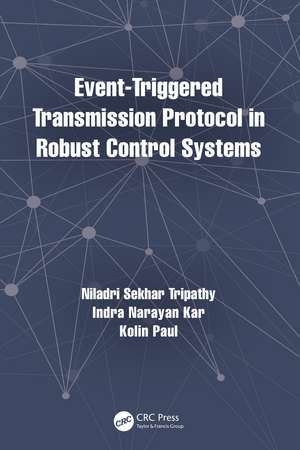Event-Triggered Transmission Protocol in Robust Control Systems
Autor Niladri Sekhar Tripathy, Indra Narayan Kar, Kolin Paulen Limba Engleză Paperback – 8 oct 2024
Features:
- Describes optimal control based robust control law for event-triggered systems.
- States results in terms of Theorems and Lemmas supported with detailed proofs.
- Presents the combination of network interconnected systems and robust control strategy.
- Includes algorithmic steps for precise understanding of the control technique.
- Covers detailed problem statement and proposed solutions along with numerical examples.
| Toate formatele și edițiile | Preț | Express |
|---|---|---|
| Paperback (1) | 438.05 lei 6-8 săpt. | |
| CRC Press – 8 oct 2024 | 438.05 lei 6-8 săpt. | |
| Hardback (1) | 1109.18 lei 6-8 săpt. | |
| CRC Press – 18 iul 2022 | 1109.18 lei 6-8 săpt. |
Preț: 438.05 lei
Preț vechi: 515.35 lei
-15% Nou
Puncte Express: 657
Preț estimativ în valută:
83.82€ • 91.33$ • 70.63£
83.82€ • 91.33$ • 70.63£
Carte tipărită la comandă
Livrare economică 23 aprilie-07 mai
Preluare comenzi: 021 569.72.76
Specificații
ISBN-13: 9781032135267
ISBN-10: 1032135263
Pagini: 156
Ilustrații: 60
Dimensiuni: 156 x 234 mm
Greutate: 0.23 kg
Ediția:1
Editura: CRC Press
Colecția CRC Press
Locul publicării:Boca Raton, United States
ISBN-10: 1032135263
Pagini: 156
Ilustrații: 60
Dimensiuni: 156 x 234 mm
Greutate: 0.23 kg
Ediția:1
Editura: CRC Press
Colecția CRC Press
Locul publicării:Boca Raton, United States
Public țintă
AcademicCuprins
1.Introduction. 2.Robust Event-triggered Control for Continuous-time Linear System. 3.Robust Event-triggered Control of Discrete-time Linear System. 4.Finite-time Event-triggered Control for a Class of Nonlinear Systems. 5.Robust Stabilization of Discrete-time Mismatched Nonlinear System. 6.Applications. 7.Appendices.
Notă biografică
Niladri Sekhar Tripathy received the bachelor’s degree in electronics and communication engineering and the master’s degree in mechatronics engineering in 2009 and 2011, respectively, and the Ph.D. degree in electrical engineering from IIT Delhi, in 2017. After completion of master’s degree, he has worked as a Senior Research Fellow (SRF) with IIT Delhi, from 2011 to 2012. From 2018 to 2019, he has worked as a Postdoctoral Researcher with the Singapore University of Technology and Design (SUTD). He is currently working as an Assistant Professor with IIT Jodhpur, India. His research interests include control techniques for cyber-physical systems, cybersecurity, mechatronics, and application of control theory in computing.
Indra Narayan Kar received the B.E. degree in electrical engineering from the Bengal Engineering College (currently IIEST), Shibpur, India, in 1988, and the M.Tech. and Ph.D. degrees in electrical engineering from IIT Kanpur, Kanpur, India, in 1991 and 1997, respectively. From 1996 to 1998, he was a Research Student with Nihon University, Tokyo, Japan, under the Japanese Government Monbusho Scholarship Program. He joined the Department of Electrical Engineering, IIT Delhi, New Delhi, India, in 1998, where he is currently a Professor and the Institute Chair Professor. He has published over 150 articles in international journals and conferences. His current research interests include nonlinear control, time- delayed control, incremental stability analysis, cyber-physical systems, and application of control theory in power networks and robotics.
Kolin Paul is a Professor in the Department of Computer Science and Engineering at IIT Delhi India. He received his B.E. degree in Electronics and Telecommunication Engineering from NIT Silchar in 1992 and Ph.D. in Computer Science in 2002 from BE College (DU), Shibpore. During 2002-3 he did his post-doctoral studies at Colorado State University, Fort Collins, USA. He has previously worked at IBM Software Labs. His last appointment was as a Lecturer in the Department of Computer Science at the University of Bristol, UK. He has also held a Visiting Position at KTH, Stockholm. His research interests are in understanding high performance architectures and compilation systems. In particular he works in the area of Adaptive/Reconfigurable Computing trying to understand its use and implications in embedded systems. He is also involved in the design of systems for affordable healthcare.
Indra Narayan Kar received the B.E. degree in electrical engineering from the Bengal Engineering College (currently IIEST), Shibpur, India, in 1988, and the M.Tech. and Ph.D. degrees in electrical engineering from IIT Kanpur, Kanpur, India, in 1991 and 1997, respectively. From 1996 to 1998, he was a Research Student with Nihon University, Tokyo, Japan, under the Japanese Government Monbusho Scholarship Program. He joined the Department of Electrical Engineering, IIT Delhi, New Delhi, India, in 1998, where he is currently a Professor and the Institute Chair Professor. He has published over 150 articles in international journals and conferences. His current research interests include nonlinear control, time- delayed control, incremental stability analysis, cyber-physical systems, and application of control theory in power networks and robotics.
Kolin Paul is a Professor in the Department of Computer Science and Engineering at IIT Delhi India. He received his B.E. degree in Electronics and Telecommunication Engineering from NIT Silchar in 1992 and Ph.D. in Computer Science in 2002 from BE College (DU), Shibpore. During 2002-3 he did his post-doctoral studies at Colorado State University, Fort Collins, USA. He has previously worked at IBM Software Labs. His last appointment was as a Lecturer in the Department of Computer Science at the University of Bristol, UK. He has also held a Visiting Position at KTH, Stockholm. His research interests are in understanding high performance architectures and compilation systems. In particular he works in the area of Adaptive/Reconfigurable Computing trying to understand its use and implications in embedded systems. He is also involved in the design of systems for affordable healthcare.
Descriere
This book considers event-triggered scheme as a transmission protocol to negotiate information exchange in resilient control for networked control systems (NCS) via a robust control algorithm to regulate the closed loop behaviour of NCS in the presence of mismatched uncertainty with limited feedback information for both linear/nonlinear systems.
